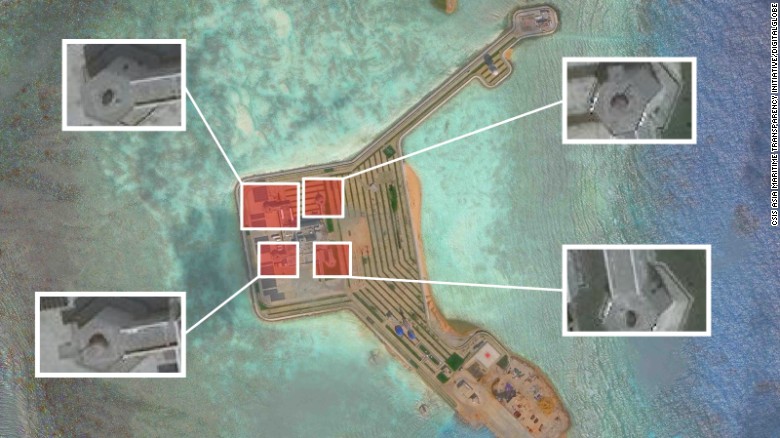By Michael Auslin

In seizing an unmanned, underwater US Navy drone in international waters off the Philippines on Thursday, China has thrown down a North Korean-style gauntlet to the incoming Trump team.
While media reports are still sketchy, it appears that a Chinese naval vessel was close enough to a US oceanographic survey ship to launch a small boat to grab the scientific drone as the American vessel was preparing to retrieve it.
That would mean a ship-to-ship level of intimidation, and not a snatch-and-grab action in isolated waters.
Like in 2009, when the Chinese harassed the USNS Impeccable in the South China Sea, the latest action comes against a similarly unarmed US research vessel.
Like in 2009, when the Chinese harassed the USNS Impeccable in the South China Sea, the latest action comes against a similarly unarmed US research vessel.
This time, however, the Chinese flagrantly flouted international law, and unlawfully seized US property while endangering the safety of US military personnel on the high seas.
Such a dramatic upping of the ante is out of character for China, and American officials should understand that Beijing now appears willing to take increasingly risky actions.
Such a dramatic upping of the ante is out of character for China, and American officials should understand that Beijing now appears willing to take increasingly risky actions.
This latest provocation may well be in response to President Trump's recent comments on China, Taiwan and the One-China Policy.
At the same time, the latest challenge comes on the heels of steadily degrading relations between the Obama Administration and China, including news that Beijing is rapidly militarizing its newly built islands located near the Philippines.
At the same time, the latest challenge comes on the heels of steadily degrading relations between the Obama Administration and China, including news that Beijing is rapidly militarizing its newly built islands located near the Philippines.
On these reclaimed shoals, China has emplaced anti-aircraft and anti-missile systems in what can also be a precursor to fielding offensive weapons capabilities.
In response, senior US military leaders have made forthright statements about America's national interest in maintaining open and uncontested sea lanes.
These comments have put Beijing on notice that Washington will not sit idly by if China appears be upending decades of peaceful development in Asia's waters.
 Until January 20, it is the current president's job to respond.
Until January 20, it is the current president's job to respond.
 Until January 20, it is the current president's job to respond.
Until January 20, it is the current president's job to respond.
The Chinese move offers Obama two choices: be seen as capitulating to a dramatic increase in Chinese aggressiveness, or leave office having taken a hard line against China's destabilizing path. Whatever course he takes, however, will almost certainly be carried over into the new administration, given how close we are to Inauguration Day.
The United States has formally demanded the return of the drone, but diplomatic protests will not be enough.
The United States has formally demanded the return of the drone, but diplomatic protests will not be enough.
While it is likely that the Chinese will surrender the drone after a few days, a toothless US response will only embolden further belligerence on Beijing's part.
The Obama Administration should make clear that if the drone is not returned, then an escalating series of reprisals will be triggered; these could include reducing military contacts and disinviting the Chinese navy from RIMPAC naval exercises, considering targeted sanctions against Chinese companies connected to the military and refusing visas for high-ranking Chinese.
Should similar offenses occur again,
Should similar offenses occur again,
Washington should make clear that it will take further action, including more direct support for nations facing Chinese pressure over their own territorial claims, such as enhanced defense cooperation and expedited supply of defensive equipment.
Through it all, Washington must maintain a constant presence in contested waters, including freedom of navigation operations near Chinese-claimed territory.
Both sides should fear a situation where cooler heads are pushed aside by surging emotion.
Both sides should fear a situation where cooler heads are pushed aside by surging emotion.
The risk of an accident between the Chinese and US militaries, or where China lashes out against a smaller Asian nation, could lead to true crisis and even an armed clash.
While it may seem risky to take a hard line now against China, Washington may have no choice later on, or it will be forced to accept a major diminution of its credibility in Asia.
Simply put, this is about stopping bullying in its tracks and maintaining stability in the world's most heavily-trafficked waterways.
Regardless of what the Obama Administration decides to do, the Trump team should be prepared for more, and more unpredictable, Chinese actions designed to get the new president to back down from his apparent intention to challenge the status quo in Sino-US relations.
Regardless of what the Obama Administration decides to do, the Trump team should be prepared for more, and more unpredictable, Chinese actions designed to get the new president to back down from his apparent intention to challenge the status quo in Sino-US relations.
They should be thinking now about how they will respond to similar Chinese challenges, or risk being thrown on the defensive to an emboldened aggressor.
The goal is not to back the Chinese into a corner or goad them into further aggression, but rather just the opposite.
The goal is not to back the Chinese into a corner or goad them into further aggression, but rather just the opposite.
Beijing must understand that such unprovoked and belligerent acts will merit a rejoinder.
Otherwise, China will get the wrong message and will continue testing the US government.
At some point, it will miscalculate or its actions will become intolerable, resulting in a more forceful US reaction.
A firm US response now is the best option for preventing a worsening cycle of tit-for-tat challenges.


Aucun commentaire:
Enregistrer un commentaire